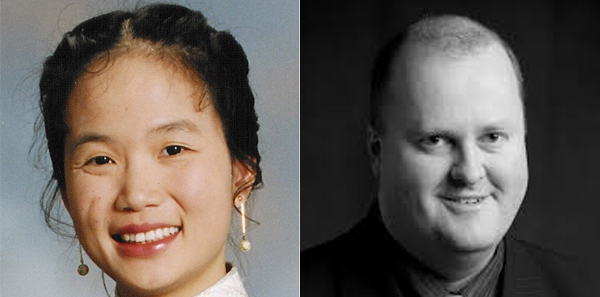1:30min

Associate Professor Celia Chen and Rod Baker
_____________________________
By Helen Carter
Journalist
Optometrists at WAVE 2018 will be reminded how minor ocular symptoms can mean major disease, and learn which drooping eyelids are dangerous and which are not so dangerous.
Ophthalmologist Associate Professor Celia Chen will give several talks at Western Australian Vision Education 2018 from 11-12 August including one on minor symptoms and major disease, and another on ptosis.
Professor Chen is a consultant neuro-ophthalmologist at the Department of Ophthalmology, Flinders Medical Centre and Flinders University, Adelaide. She undertook her ophthalmology training in South Australia and proceeded to a clinical and research fellowship in neuro-ophthalmology at the Wilmer Eye Institute, Johns Hopkins Hospital, America.
Her talk on symptoms and disease will highlight cases where patients have presented with symptoms which could be viewed as minor but if further investigations were not done, serious and potentially fatal diseases could have been missed.
These include a young woman with recent onset blurry eye who could not focus properly. The initial examination was normal but further investigations revealed she had multiple sclerosis.
‘The take home message, from this case, is that when someone complains of blurred vision but the examination is normal, check the visual field,’ Professor Chen said.
Ptosis approaches and causes
Professor Chen will also discuss a practical approach to ptosis and optometrists will learn about causes for ptosis and which is a dangerous ptosis.
‘In ptosis, the practical approach can be neurological, neuromuscular, muscular, aponeurotic or mechanical,’ Professor Chen said.
‘Think of possible causes, for example, third nerve palsy is a neurological cause of ptosis, and look for the associated features such as anisocoria and diplopia.
‘Uninvestigated, one-third of third nerve palsies are due to a cerebral aneurysm. Of these, two-thirds will rupture if not treated and once rupture occurs there is 50 per cent mortality.
‘Horner’s syndrome is also a neurological cause of mild ptosis and miosis.’
Other causes of ptosis to be discussed include neuromuscuolar diseases such as myasthenia gravis, muscular disorders such as chronic progressive external ophthalmoplegia and myotonic dystrophy, aponeurotic ptosis and mechanical causes.
Children’s vision
Optometrist Rod Baker from Melbourne will give several talks on children’s eye health, vision learning and additional needs, vision therapy and providing care to children aged three and under.
He has a practice in Sunbury which caters specifically to children, and in 2013 he established paediatric teaching within the Flinders University optometry course.
‘A developmental child-centred approach is important when providing care to zero to three-year-olds,’ he said.
‘This involves looking at where the child is now, taking a thorough relevant paediatric history to determine how they got there, looking at where they are going with or without your help which involves functioning in collaborative paediatric practice, and what optometry help they need by connecting your practice to the best available evidence.
‘Collaborative paediatric practice is more than just giving and receiving referrals. It is hard work to commit to effective communication, and learning from and contributing to the framework of practice of others.’
He suggests optometrists ensure appropriate frequency of developmental observation.
Meet OWA’s Evan MacRae

Optometry Western Australia’s new Executive Officer Evan MacRae is excited by the line-up and said he was looking forward to meeting OWA members at his first WAVE, at the recently re-developed beachside area of Rendezvous Hotel in Scarborough, Perth.
‘WAVE is a unique conference combining practical hands-on education and training via clinical workshops and real life examples, with leading eye health professionals and other related practitioners as presenters,’ he said.
‘The professional program combined with workshops demonstrating the latest techniques and practical solutions is jam packed with relevant information.
‘Supporting the professional development program is a range of first class, high quality, innovative suppliers to the industry and a program of regular networking and social activities.’
Clinical workshops on the Saturday and lectures on both days attract up to 42 CPD points, including 28 therapeutic points. There will also be a Sundowner evening with canapes, drinks and entertainment on Saturday, and a trade exhibition.
A free event attracting CPD points for Early Career Optometrists (ECOs) will take place on Friday evening, 10 August. Registrations open at 5:00pm for a 5:30pm start. Six lectures run from 5:30pm to 8:15pm with food and drinks served afterwards.
Register for WAVE via the member portal or here. Early bird discounts apply until 1 August.
Register here for the ECO event.
_____________________________
Tagged as: Other eye diseases, WAVE WA